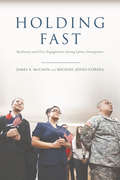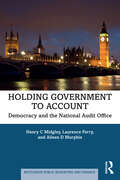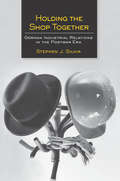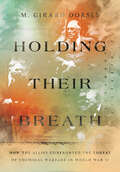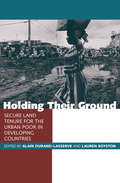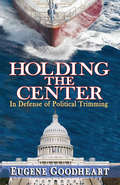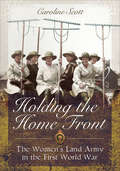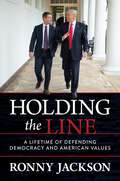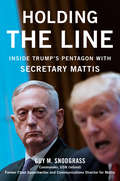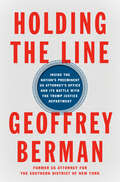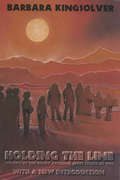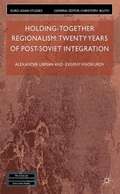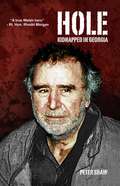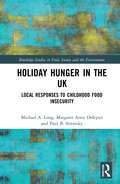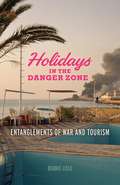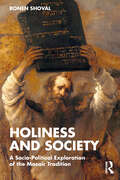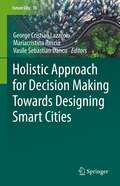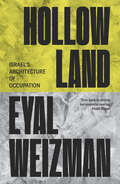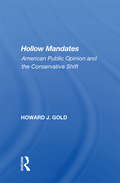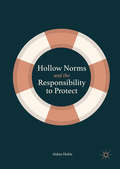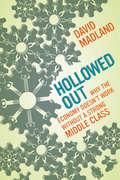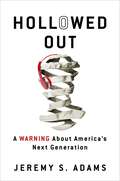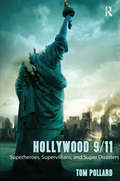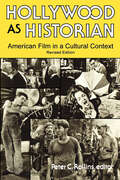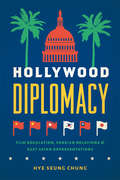- Table View
- List View
Holding Fast: Resilience and Civic Engagement Among Latino Immigrants
by Michael Jones-Correa James A. McCannThe fight over immigration reform and immigrants’ rights in the U.S. has been marked by sharp swings in both public sentiment and official enforcement. In 2006, millions of Latino immigrants joined protests for immigration reform. Deferred Action for Childhood Arrivals, a policy granting work permits and protection from deportation to undocumented immigrants who entered the country before age 16, was enacted in 2012, despite a sharp increase in deportations during the Bush and Obama administrations. The 2016 election of Donald J. Trump prompted a surge in anti-immigrant sentiment which threatened DACA and other progressive immigration policies. In Holding Fast, political scientists James McCann and Michael Jones-Correa investigate whether and how these recent shifts have affected political attitudes and civic participation among Latino immigrants. Holding Fast draws largely from a yearlong survey of Latino immigrants, including both citizens and noncitizens, conducted before and after the 2016 election. The survey gauges immigrants’ attitudes about the direction of the country and the emotional underpinnings of their political involvement. While survey respondents expressed pessimism about the direction of the United States following the 2016 election, there was no evidence of their withdrawal from civic life. Instead, immigrants demonstrated remarkable resilience in their political engagement, and their ties to America remained robust. McCann and Jones-Correa examine Latino immigrants’ trust in government as well as their economic concerns and fears surrounding possible deportations of family members and friends. They find that Latino immigrants who were concerned about the likelihood of deportation were more likely to express a lack of trust in government. Concerns about personal finances were less salient. Disenchantment with the U.S. government did not differ based on citizenship status, length of stay in America, or residence in immigrant-friendly states. Foreign-born Latinos who are naturalized citizens shared similar sentiments to those with fewer political rights, and immigrants in California, for example, express views similar to those in Texas. Addressing the potential influence immigrant voters may wield in in the coming election, the authors point to signs that the turnout rate for naturalized Latino immigrant may be higher than that for Latinos born in the United States. The authors further underscore the importance of the parties' platforms and policies, noting the still-tenuous nature of Latino immigrants’ affiliations with the Democratic Party. Holding Fast outlines the complex political situation in which Latino immigrants find themselves today. Despite well-founded feelings of anger, fear, and skepticism, in general they maintain an abiding faith in the promise of American democracy. This book provides a comprehensive account of Latino immigrants’ political opinions and a nuanced, thoughtful outlook on the future of Latino civic participation. It will be an important contribution to scholarly work on civic engagement and immigrant integration.
Holding Government to Account: Democracy and the National Audit Office (Routledge Public Budgeting and Finance)
by Laurence Ferry Henry C Midgley Aileen D MurphieThe National Audit Office has played an important role in the checks and balances of the UK parliamentary and political system over the last 40 years. This new book, more than just a history of the UK’s supreme audit institution, examines the very definition of accountability through both an historic and an academic lens, critically exploring questions about the role of audit in a democracy and how well it is working.Holding Government to Account draws on several unique sources of evidence, including interviews with senior officials from the National Audit Office and the civil service, as well as senior parliamentarians with experience of the NAO’s relationships with government and legislature. These interviews are supplemented by an analysis of previously unpublished manuscript material in the National Archives, examination of NAO reports and parliamentary and other reports focused on accountability. The book begins with a history of the National Audit Office in the context of the UK’s wider history. It then offers an overview of the constitutional, political and human legacies of the Exchequer and Audit Department, followed by a close examination of the National Audit Office’s leadership and decision-making from inception in 1984 through to the present. The authors conclude with an exploration of the way in which the meaning of public sector audit has evolved over time, in accordance with its wider political, ideological and material context. In doing so, they demonstrate that any question about the National Audit Office’s future and organisation is really a question about what democracy and good government mean in a modern bureaucratic state.Holding Government to Account will be of keen interest to students enrolled in courses on accounting, public administration, law and politics as well as to politicians, civil servants and Supreme Audit Institutions internationally.
Holding The Shop Together: German Industrial Relations in the Postwar Era
by Stephen J. SilviaSince the onset of the Great Recession, Germany’s economy has been praised for its superior performance, which has been reminiscent of the economic miracle of the 1950s and 1960s. Such acclaim is surprising because Germany’s economic institutions were widely dismissed as faulty just a decade ago. In Holding the Shop Together, Stephen J. Silvia examines the oscillations of the German economy across the entire postwar period through one of its most important components: the industrial relations system. As Silvia shows in this wide-ranging and deeply informed account, the industrial relations system is strongest where the German economy is strongest and is responsible for many of the distinctive features of postwar German capitalism. It extends into the boardrooms, workplaces and government to a degree that is unimaginable in most other countries. Trends in German industrial relations, moreover, influence developments in the broader German economy and, frequently, industrial relations practice abroad. All these aspects make the German industrial relations regime an ideal focal point for developing a deeper understanding of the German economy as a whole. Silvia begins by presenting the framework of the German industrial relations system-labor laws and the role of the state-and then analyzes its principal actors: trade unions and employers’ associations. He finds the framework sound but the actors in crisis because of membership losses. Silvia analyzes the reasons behind the losses and the innovative strategies German labor and management have developed in their efforts to reverse them. He concludes with a comprehensive picture and then considers the future of German industrial relations.
Holding Their Breath: How the Allies Confronted the Threat of Chemical Warfare in World War II (Battlegrounds: Cornell Studies in Military History)
by M. Girard DorseyHolding Their Breath uncovers just how close Britain, the United States, and Canada came to crossing the red line that restrained chemical weapon use during World War II. Unlike in World War I, belligerents did not release poison gas regularly during the Second World War. Yet, the looming threat of chemical warfare significantly affected the actions and attitudes of these three nations as they prepared their populations for war, mediated their diplomatic and military alliances, and attempted to defend their national identities and sovereignty.The story of chemical weapons and World War II begins in the interwar period as politicians and citizens alike advocated to ban, to resist, and eventually to prepare for gas use in the next war. M. Girard Dorsey reveals, through extensive research in multinational archives and historical literature, that although poison gas was rarely released on the battlefield in World War II, experts as well as lay people dedicated significant time and energy to the weapon's potential use; they did not view chemical warfare as obsolete or taboo. Poison gas was an influential weapon in World War II, even if not deployed in a traditional way, and arms control, for various reasons, worked. Thus, what did not happen is just as important as what did. Holding Their Breath provides insight into these potentialities by untangling World War II diplomacy and chemical weapons use in a new way.
Holding Their Ground: Secure Land Tenure for the Urban Poor in Developing Countries
by Alain Durand-Lasserve Lauren RoystonSecurity of land tenure for the urban poor is now a major problem for developing cities in Africa, Asia and Latin America. This book presents and analyzes the main conclusions of a comparative research programme on land tenure issues. It looks at how solutions can be found and implemented to respond to the demands and needs of the majority of squatters and informal settlements, and analyzes how urban stakeholders, with different social, legal and economic constraints, find innovative and flexible solutions. The book is intended to fill a gap in the literature on comparative research on tenure policies and should be useful to researchers and professionals involved in defining and instigating tenure upgrading policies and programmes.
Holding the Center: In Defense of Political Trimming
by Eugene GoodheartPoliticians and pundits often scorn polarization and compromise—the intransigence of the former and the feebleness of the latter—without suggesting an alternative way. Polarization, when opposing forces are equal or close to equal in strength, leads to stalemate. Compromise threatens to betray one's conviction about what is essential. Ideally, a leader must combine conviction about what ought to be done with an open-minded awareness of unintended consequences.The social sciences are or should be based, largely, on the premise that people are historical and social beings. Holding the Center follows this tradition, while focusing on the trimming aspect. In nautical terms, trimming indicates an adjustment of one's vessel to accommodate one's environment. In politics, it is to find common ground between extremes, not for the sake of compromise, but because reason does not have a single location on the political spectrum.The twelve chapters in this book are brought together by Goodheart's argument that the Whig trimming tradition is the heart and soul of politics in the West, and that both democracy and democratic culture depend upon the trimming tradition's advocacy of toleration. What is needed now, he notes, is a transformation in our political culture in which humility and the admission of error enter the list of political virtues. Non-parliamentary democracy with its separation of powers depends for its proper functioning on compromise, especially in a time like ours of crisis and divided government.
Holding the Home Front: The Women's Land Army in the First World War
by Caroline ScottAn &“insightful and extensive&” history of the women who took over agricultural duties in England during World War I (Sussex Living Magazine). One could be forgiven for supposing that the story of the Women&’s Land Army starts in 1939 during World War II. But it&’s a much older and more complicated history . . . British agricultural policy during the First World War was held up as a success story; domestic food production was higher at the end of the war than at the start, the average calorific value of the British diet barely changed, and bread never had to be rationed. As the press reported starvation and food riots overseas, the 1918 harvest was held up as &“one of the great achievements of the War.&” In 1917, at the darkest hour, when Britain&’s food security looked most precarious, it was said that, &“if it were not for the women agriculture would be absolutely at a standstill on many farms.&” Using previously unpublished accounts and photographs, this book is an attempt to understand how the return of women to the fields and farmyards impacted agriculture—and, in turn, an examination of how that experience affected them. &“Caroline&’s wonderful book sets the record straight with beautiful illustrations and witting testimony from people who were there and saw how hard these wonderful women worked to keep Britain going during their darkest hours. Superb.&” —Books Monthly &“This is a well-researched history of the British Women&’s Land Army in WW1 and how it paved the way for the success of the WLA in the Second World War.&” —World War One Illustrated
Holding the Line: A Lifetime of Defending Democracy and American Values
by Ronny JacksonA behind-the-scenes political memoir written by a prominent White House physician.I would talk to the president before the chief of staff even saw the president in the morning. I walked into work, and I was already in the Oval Office talking to President Trump. It was rarely medical, to be honest with you; it was whatever was going on in the news. I&’d be the first person he&’d see in the morning. The president was completing tasks two to three hours before anybody else showed up in the West Wing to work. He&’d get up at five o&’clock in the morning and would be watching TV, tweeting, making phone calls, and doing all types of other tasks. President Trump would poke his head into my office or I&’d walk out, and we would say, &“Good morning. Did you see this or that?&” He was always asking me about things on TV and what was going on, from Iran to Stormy Daniels. He&’d say, &“Walk with me.&” So I&’d walk him to the Oval Office, and we&’d talk about everything. I&’d walk out through the outer Oval Office and the chief of staff, national security advisor, and even the CIA briefer would be standing there, waiting to get in and talk to him. I&’d walk out, they&’d walk in, and his day would start. I was the first person he saw every morning and the last person he saw every evening when he went to bed.
Holding the Line: Inside Trump's Pentagon with Secretary Mattis
by Guy M. Snodgrass"This is the memoir America wishes Jim Mattis had written." —The Washington PostAn insider's sometimes shocking account of how Defense Secretary James Mattis led the US military through global challenges while serving as a crucial check on the Trump Administration.For nearly two years as Trump's Secretary of Defense, General James Mattis maintained a complicated relationship with the President. A lifelong Marine widely considered to be one of America's greatest generals, Mattis was committed to keeping America safe. Yet he served a President whose actions were frequently unpredictable and impulsive with far-reaching consequences. Often described as the administration's "adult in the room," Mattis has said very little about his difficult role, and since his resignation has kept his views of the President and his policies private. Now, Mattis's former chief speechwriter and communications director, Guy M. Snodgrass, brings readers behind that curtain. Drawing on his seventeen months working with Mattis, Snodgrass reveals how one of the nation's greatest generals walked a political tightrope while leading the world's most powerful military.Snodgrass gives us a fly-on-the-wall view as Mattis... • Reacted when learning about major policy decisions via Twitter rather than from the White House. • Minimized the damage done to our allies and diplomatic partners. • Slow-rolled some of Trump's most controversial measures, with no intention of following through.As the first book written by an insider with firsthand knowledge of key decisions and moments in history, Holding the Line is a must-read for those who care about the presidency and America's national security. It's filled with never-before-told stories that will both alarm and reassure, a testament to the quiet and steady efforts of General Mattis and the dedicated men and women he led at the Department of Defense.
Holding the Line: Inside the Nation's Preeminent US Attorney's Office and Its Battle With the Trump Justice Department
by Geoffrey Berman"Throughout my tenure as US attorney, Trump's Justice Department kept demanding that I use my office to aid them politically, and I kept declining—in ways just tactful enough to keep me from being fired. I walked this tightrope for two and a half years. Eventually, the rope snapped." - from Holding the Line. <p><p>The gripping and explosive memoir of serving as US Attorney for the Southern District of New York, in the face of the Justice Department’s attempts to protect Trump’s friends and punish his enemies. <p><p> Ascending to the leadership role of US Attorney for the Southern District, which includes Manhattan and several counties to the north, is a capstone to any legal career: it entails guiding a team of the best lawyers in America in selecting and winning cases that often have global import. Geoffrey Berman was honored to be tapped for the job by Donald Trump in 2018. The manner in which Trump had dispatched his predecessor, Preet Bharara, was troubling, but the institution was fabled for its independence. Surely he could manage. So began one of the most tumultuous two-and-a-half-year stretches in the over two-hundred-thirty year history of the office. Almost immediately, Berman found himself pushing back against the Trump Justice Department’s blatant efforts to bring weak cases against political foes and squash worthy cases that threatened to tarnish allies and Trump himself. When Bill Barr became attorney general, Berman hoped and believed things would get better, but instead they got much worse. <p><p>The heart of Holding the Line is his never-before-told account of the lengths Barr went to in corrupting the independence of the office, and the lengths Berman had to go in preserving it. Finally, Trump and Barr, fed up with Berman’s principles, summarily fired him, though he refused to go quietly and prevented Barr from installing someone who might be more compliant. Berman’s determined defense of the values of prosecutorial independence, without fear or favor, made him a hero to everyone who shares those values. <p><p>Holding the Line also relates the remarkable casework of the Southern District in Berman’s time there, including taking down notorious sex traffickers Jeffrey Epstein and Lawrence Ray, Big Pharma executives, and vicious criminal syndicates, and repatriating Nazi-looted art. Riveting in themselves, these stories showcase the esprit de corps that makes the Southern District so special, and the stakes Berman felt in protecting its integrity against all foes, up to and including the US attorney general and the president of the United States. <p> <b>New York Times Bestseller</b>
Holding the Line: Women in the Great Arizona Mine Strike of 1983
by Barbara KingsolverHolding the Line, Barbara Kingsolver's first non-fiction book, is the story of women's lives transformed by an a signal event. Set in the small mining towns of Arizona, it is part oral history and part social criticism, exploring the process of empowerment which occurs when people work together as a community. Like Kingsolver's award-winning novels, Holding the Line is a beautifully written book grounded on the strength of its characters. Hundreds of families held the line in the 1983 strike against Phelps Dodge Copper in Arizona. After more than a year the strikers lost their union certification, but the battle permanently altered the social order in these small, predominantly Hispanic mining towns. At the time the strike began, many women said they couldn't leave the house without their husband's permission. Yet, when injunctions barred union men from picketing, their wives and daughters turned out for the daily picket lines. When the strike dragged on and men left to seek jobs elsewhere, women continued to picket, organize support, and defend their rights even when the towns were occupied by the National Guard. "Nothing can ever be the same as it was before," said Diane McCormick of the Morenci Miners Women's Auxiliary. "Look at us. At the beginning of this strike, we were just a bunch of ladies. "
Holding-Together Regionalism: Twenty Years of Post-Soviet Integration
by Alexander Libman Evgeny VinokurovLibman and Vinokurov discuss the evolution of post-Soviet regional integration as a prominent case of 'holding-together regionalism' - integration of countries originally belonging to a single political entity. They provide a detailed account of the economic, political and social aspects of the interaction of post-Soviet countries, studying both formal regionalism and informal linkages between companies and individuals. The book pays particular attention to the political economy of this process, assessing both the reasons for the ineffectiveness of post-Soviet regionalism until recently and the driving forces of its persistence. It investigates migration flows, mutual trade and investments, as well as interaction in key sectors of infrastructure, such as telecommunications, transportation, agriculture and power utilities.
Hole: Kidnapped in Georgia
by Peter ShawIn June 2002, Peter Shaw, a banker from Wales, was brutally kidnapped by a Pseudo-military organisation in a busy suburb of Tbilisi, the capital city of Georgia, in eastern Europe. Hole is the harrowing account of his five month captivity and subsequent 'escape' in November 2002. Peter's powerful and moving story focuses on how he managed to ensure the physical and mental torture inflicted upon him by his captors, particuarly during the 141 days when he was held in apalling conditions, chained by the neck in a tiny cell three meters underground, unlit, cold, wet and isolated. His eventual reunion with his loved ones provides a moving climax to the story.
Holiday Hunger in the UK: Local Responses to Childhood Food Insecurity (Routledge Studies in Food, Society and the Environment)
by Paul B. Stretesky Michael A. Long Margaret Anne DefeyterThis timely and much-needed book focuses on the phenomenon often referred to as "holiday hunger" in the United Kingdom. The book begins by outlining the history and scope of holiday hunger – the condition that occurs when a child’s household is, or will become, food insecure during the summer holidays. The decline of the UK welfare state and the rise of neoliberalism have created a situation where up to three million children in the UK face food insecurity during the summer months when there are extra financial pressures on the working poor and when free school meals are not available. This book details the level of childhood and household food insecurity in the UK and describes one of the main responses to holiday hunger – holiday clubs. These clubs are locally organised and funded and provide a place for children to go to eat nutritious meals for free during the school holidays. Highlighting the benefits of holiday clubs that often extend beyond food provision, this book also discusses the challenges that they face now and in the future. The book concludes with recommendations for food insecurity policy and the role of government in fighting holiday hunger. This book will be of great interest to students and scholars of food and nutrition security, social policy and public health.
Holidays in the Danger Zone: Entanglements of War and Tourism (Critical War Studies)
by Debbie LisleHolidays in the Danger Zone exposes the mundane and everyday interactions between two seemingly opposed worlds: warfare and tourism. Debbie Lisle shows how a tourist sensibility shapes the behavior of soldiers in war—especially the experiences of Western military forces in &“exotic&” settings. This includes not only R&R but also how battlefields become landscapes of leisure and tourism. She further explores how a military sensibility shapes the development of tourism in the postwar context, from &“Dark Tourism&” (engaging with displays of conflict and atrocity) to exhibitions of conflict in museums and at memorial sites, as well as advertising, film, journals, guidebooks, blogs, and photography. Focused on how war and tourism reinforce prevailing modes of domination, Holidays in the Danger Zone critically examines the long historical arc of the war–tourism nexus—from nineteenth-century imperialism to World War I and World War II, from the Cold War to globalization and the War on Terror.
Holiness and Society: A Socio-Political Exploration of the Mosaic Tradition
by Ronen ShovalExploring the subtle political philosophy within the Biblical narrative, this book presents enduring insights that complement Ancient Greek philosophy for contemporary political distinctions – uncovering overlooked socio-political ideologies to provide a unique perspective alongside the classical philosophical tradition.By adopting a sociological approach, Ronen Shovel interprets the Bible as a reflection of perspectives and ideologies, emphasizing the intricate dynamics between rulers and subjects, balancing justice, and power within societies. A key focus is the examination of holiness as a distinct political category, influencing institutions, ethics, justice, and even the use of force. This perspective challenges traditional religious scholarship, merging sociology with the concept of holiness.Holiness and Society enriches political philosophy, religious studies, and sociology, broadening their boundaries and offering fresh perspectives, serving as a bridge between antiquity and modernity, providing valuable insights into contemporary political thought.
Holistic Approach for Decision Making Towards Designing Smart Cities (Future City #18)
by George Cristian Lazaroiu Mariacristina Roscia Vasile Sebastian DancuThis edited volume examines strategies to make future cities more sustainable. The aim of these and other initiatives of the recent past, is to transform our cities into smarter cities. Thereby, these solutions are determined to boost clean electricity and pollution reduction, improve the life of citizens and transform city environment and regulatory structures. As the EUs ambition is to become carbon-neutral until 2050, the outlined projects also consider fostering economy prosperity and social wellness and environmental sustainability. The greatest challenge being already built urban spaces that need to be transformed quickly and at low costs. The book will analyze future smart cities in three centric dimensions: energy and sustainable development, smart infrastructures for smart cities, social involvement and economic prosperity. With its global approach, the volume is highly useful for professionals involved in city planning and urban ecology.
Hollow Land: Israel's Architecture of Occupation
by Eyal WeizmanAcclaimed exploration of the political space created by Israel&’s colonial occupationThis new edition of the classic work on the politics of architecture—and the architecture of politics—appears on the fiftieth anniversary of the Six-Day War, which expanded Israel&’s domination over Palestinian lands.From the tunnels of Gaza to the militarized airspace of the Occupied Territories, Eyal Weizman unravels Israel&’s mechanisms of control and its transformation of Palestinian homes into a war zone under constant surveillance. This is essential reading for those seeking to understand how architecture and infrastructure are used as lethal weapons in the formation of Israel.
Hollow Mandates: American Public Opinion And The Conservative Shift
by Howard J. GoldExamining American public opinion from the Johnson administration through the Reagan years, this book uncovers the true nature of American public opinion, showing that, in fact, the American public has not embraced a conservative ideology.
Hollow Norms and the Responsibility to Protect
by Aidan HehirThis book explains why there is a pronounced disjuncture between R2P's habitual invocation and its actual influence, and why it will not make the transformative progress its proponents claim. Rather than disputing that R2P is a norm, or declaring that norms are insignificant, Hehir engages with post-positivist constructivist accounts on the role of norms to demonstrate first, that the efficacy of a norm is not directly related to the extent to which it is proliferated or invoked, and second, that in the post-institutionalization phase, norms undergo both contestation and (potentially regressive) reinterpretation. This volume analyses the evolution of R2P, and demonstrates that it has been steadily circumscribed and co-opted, so that today it has no power to meaningfully influence the behaviour of states. It is essential reading for academic audiences in the disciplines of International Relations and International Law.
Hollowed Out
by David MadlandFor the past several decades, politicians and economists thought that high levels of inequality were good for the economy. But because America's middle class is now so weak, the US economy suffers from the kinds of problems that plague less-developed countries. As Hollowed Out explains, to have strong, sustainable growth, the economy needs to work for everyone and expand from the middle out. This new thinking has the potential to supplant trickle-down economics--the theory that was so wrong about inequality and our economy--and shape economic policymaking for generations.
Hollowed Out: A Warning about America's Next Generation
by Jeremy S. AdamsDo teachers have a front row seat to America&’s decline? Jeremy S. Adams, a teacher at both the high school and college levels, thinks so. Adams has spent decades trying to instill wisdom, ambition, and a love of learning in his students. And yet, as he notes, when teachers get together, they often share an arresting conclusion: Something has gone terribly wrong. Something essential is missing in our young people. Their curiosity seems stunted, their reason undeveloped, their values uninformed, their knowledge lacking, and most worrying of all, their humanity diminished. Digital hermits of a sort unfamiliar to an older generation, they have little interest in marriage and family. They largely dismiss—and are shockingly ignorant of—religion. They sneer at patriotism, sympathize with riots and vandalism, and regard American society and civilization as so radically flawed that it must be dismantled. Often friendless and depressed, they eat alone, study alone, and even &“socialize&” alone. Educators like Adams see a generation slipping away. The problems that have hollowed out our young people have been festering for years. A year of COVID-19 lockdowns and social distancing have magnified them. The result could be a generation—and our nation&’s future—lost in a miasma of alienation and stupefaction. In his stunning new book, Hollowed Out, Jeremy S. Adams reveals why students have rejected the wisdom, culture, and institutions of Western civilization—and what we can do to win them back. Poignant, frightening, and yet inspiring, this is a book for every parent, teacher, and patriot concerned for our young people and our country
Hollywood 9/11: Superheroes, Supervillains, and Super Disasters
by Tom PollardThe terrorist attacks of September 11, 2001, and the subsequent US-led invasions of Afghanistan in 2001 and Iraq in 2003 profoundly affected all aspects of society, including cinema. Or did they? Even now, years after those horrific events, debate still rages over their impact on films. At the time many expected Hollywood to tamp down graphic movie violence, while others hoped that filmmakers would finally lay bare volatile socio-political issues fuelling terrorist attacks. In fact, what has emerged is a thicket of darkly pessimistic genres including thrillers, combat films, sci-fi, and horror that makes pre-9/11 films appear naive and optimistic. Hollywood 9/11 explores this transformation, critically examining everything from Harry Potter and the Half-Blood Prince to The Hurt Locker and placing the films in the context of both the socio-political scene and the history of cinema.
Hollywood As Historian: American Film in a Cultural Context
by Peter C. Rollins“A commendably comprehensive analysis of the issue of Hollywood’s ability to shape our minds . . . invigorating reading.” ?BooklistFilm has exerted a pervasive influence on the American mind, and in eras of economic instability and international conflict, the industry has not hesitated to use motion pictures for propaganda purposes. During less troubled times, citizens’ ability to deal with political and social issues may be enhanced or thwarted by images absorbed in theaters. Tracking the interaction of Americans with important movie productions, this book considers such topics as racial and sexual stereotyping; censorship of films; comedy as a tool for social criticism; the influence of “great men” and their screen images; and the use of film to interpret history. Hollywood As Historian benefits from a variety of approaches. Literary and historical influences are carefully related to The Birth of a Nation and Apocalypse Now, two highly tendentious epics of war and cultural change. How political beliefs of filmmakers affected cinematic styles is illuminated in a short survey of documentary films made during the Great Depression. Historical distance has helped analysts decode messages unintended by filmmakers in the study of The Snake Pit and Dr. Strangelove. Hollywood As Historian offers a versatile, thought-provoking text for students of popular culture, American studies, film history, or film as history. Films considered include: The Birth of a Nation (1915), The Plow that Broke the Plains (1936), The River (1937), March of Time (1935-1953), City Lights (1931), Modern Times (1936), The Great Dictator (1940), The Grapes of Wrath (1940), Native Land (1942), Wilson (1944), The Negro Soldier (1944), The Snake Pit (1948), On the Waterfront (1954), Dr. Strangelove (1964), Who’s Afraid of Virginia Woolf? (1966), and Apocalypse Now (1979).“Recommended reading for anyone concerned with the influence of popular culture on the public perception of history.” ?American Journalism
Hollywood Diplomacy: Film Regulation, Foreign Relations, and East Asian Representations
by Hye Seung ChungHollywood Diplomacy contends that, rather than simply reflect the West’s cultural fantasies of an imagined “Orient,” images of Chinese, Japanese, and Korean ethnicities have long been contested sites where the commercial interests of Hollywood studios and the political mandates of U.S. foreign policy collide, compete against one another, and often become compromised in the process. While tracing both Hollywood’s internal foreign relations protocols—from the “Open Door” policy of the silent era to the “National Feelings” provision of the Production Code—and external regulatory interventions by the Chinese government, the U.S. State Department, the Office of War Information, and the Department of Defense, Hye Seung Chung reevaluates such American classics as Shanghai Express and The Great Dictator and applies historical insights to the controversies surrounding contemporary productions including Die Another Day and The Interview. This richly detailed book redefines the concept of “creative freedom” in the context of commerce: shifting focus away from the artistic entitlement to offend foreign audiences toward the opportunity to build new, better relationships with partners around the world through diplomatic representations of race, ethnicity, and nationality.
